- Home
- Carolyn Wells
The Clue Page 11
The Clue Read online
Page 11
“She was indeed, desperately so.”
“Yet she seemed greatly attached to her cousin, Mr. Willard.”
“That was partly a cousinly affection, and partly a sort of coquetry to pique Mr. Carleton.”
“And was Carleton devoted to her?”
“Must I answer that?” Cicely’s eyes looked troubled.
“Yes, you must.” Fessenden’s voice was very gentle.
“Then he was not devoted to her; in fact, he loved another.”
“Who is this other?”
“Dorothy Burt, his mother’s companion, who lives at the Carleton home.”
“Did Miss Van Norman know this?”
“Yes, she learned of it lately, and it broke her heart. That is why she was so uncertain and erratic in her moods; that is why she coquetted with Mr. Willard, to arouse Schuyler Carleton’s jealousy.”
“This throws a new light on it all,” said Fessenden gravely. “And this Miss Burt—did she return Carleton’s regard?”
“I don’t know,” said Cicely, and her agitation seemed to increase, though she tried hard to conceal it. “Of course Miss Van Norman didn’t speak openly of this matter, but I knew her so well that I easily divined from her moods and her actions that she knew she had a rival in Mr. Carleton’s affections.”
“Then he cared more for her in time past?”
“Yes, until that girl came to live with his mother. She’s a designing little thing, and she just twisted Mr. Carleton round her finger.”
“Do you know her personally, Miss Dupuy?”
A look of intense hatred came over Cicely’s expressive face.
“No! I wouldn’t meet her for anything. But I have seen her, and I know perfectly well that Mr. Carleton cares for her more than he did for Miss Van Norman.”
“Yet he was about to marry Miss Van Norman.”
“Yes; because they were engaged before he saw the Burt girl. Then, you see, he didn’t think it honorable to refuse to marry her, and she—”
“He had asked her, then, to give him back his freedom?”
“Yes, he had. And Miss Van Norman very rightly refused to do so.”
“Oh, no!” cried Kitty, “do you know this, or are you only surmising it?”
“I know it, Miss French. In her sorrow over the matter, Miss Van Norman often confided in me as in a friend.”
“And you were a good friend to her, I’m sure,” said Fessenden heartily. “Now, Miss Dupuy, do you think it could have been possible that Mr. Carleton came here late last night to ask Miss Van Norman once again to release him from the marriage?”
“He might have done so,” said Cicely in a noncommittal tone. “He was very much annoyed at her behavior with Mr. Willard in the afternoon.”
“But that was on purpose to annoy him?”
“Yes, and it succeeded.”
“How do you know all this?”
“Miss Van Norman intimated as much just before dinner, when we were here alone. She feared Mr. Carleton was so angry he wouldn’t come to dinner at all.”
“And he didn’t.”
“No, he didn’t.”
“But, Miss Dupuy, it would scarcely be possible to think that if he did return later to ask his release—it would not be possible to think that on Miss Van Norman’s refusal to release him he—was so incensed against her that.”
“Oh, no, no!” cried Cicely. “Of course he didn’t kill her! Of course he didn’t! She killed herself! I don’t care what any one says—I know she killed herself!”
“If so,” said Fessenden, “we must prove it by keeping on with our investigations. And now, Miss Dupuy, will you tell me what was your errand when you returned to the library late last night, when the two doctors were alone there in charge of the room?”
“I didn’t!” declared Cicely, her cheeks flaming and her blue eyes fairly glaring at her interrogator.
“Please stick to the truth, Miss Dupuy,” said Fessenden coldly. “If you don’t, we can’t credit any of your statements. You opened the door very softly, and were about to enter, when you spied the doctors and withdrew.”
“I went to get that paper,” said Cicely, somewhat sulkily.
“Why did you want that?”
“Because it was mine. I had a right to it.”
“Then why didn’t you go on in and get it? The doctors’ presence need have made no difference.”
“I don’t know why I didn’t! I wish you’d stop asking questions!”
“I will, in a moment. You are sure you wrote that paper yourself?”
“Of course I am!” The answer was snapped out pertly.
“And you wrote it meaning yourself? You didn’t write it with the intent that it should be taken for Miss Van Norman’s message?”
Cicely eyes dropped involuntarily. Then she raised them, and stared straight at Fessenden. “What do you mean?” she asked haughtily.
“Just what I say. Was that written paper an expression of your own heart’s secret?”
It must have been because of Fessenden’s magnetism, or compelling sympathy, but for some reason Cicely took no offense at this, and answered simply, “Yes.”
“Strange,” mused Rob, “how that man won so many women’s hearts.”
“No, it isn’t strange,” said Cicely, also in slow, thoughtful tones. And then, suddenly realizing the admission she had made, and seeing how she had revealed her own secret she flew into a rage.
“What do you mean?” she cried. “I didn’t refer to Mr. Carleton.”
“Yes, you did,” said Fessenden, so quietly that again Cicely was silent, and Kitty sat surprised almost to breathlessness.
“There is to be only truth between us,” went on Rob. You did mean Mr. Carleton, by the letter ‘S’; but have no fear, your secret shall be respected. Now we will have only the truth—remember that. So please tell me frankly at what time you saw Mr. Carleton come into the house last night?”
“Just a few moments before half-past eleven.” Cicely said this glibly, as if reciting a carefully conned lesson.
“Wait a moment—you forget that Mr. Hunt fixed the time at quarter after eleven, and that he saw you looking over the baluster at the same time.”
With an agonized cry of dismay, Miss Dupuy fainted into utter unconsciousness.
Perplexed and baffled in his inquiries, Fessenden saw that for the moment Miss Dupuy’s physical condition was of paramount importance, and at Kitty’s request he rang for Marie. Even before she came the others had placed Cicely gently on a couch, and when the maid arrived Fessenden left the room, knowing that the girl was properly cared for.
Going downstairs again, he was about to make his adieux to Mrs. Markham and leave the house, when Kitty French, coming down soon after him, asked him to stay a few minutes longer.
The sight of her pretty face drove more serious thoughts from his mind, and he turned, more than willing to follow where she led. “Oh, whistle, and I’ll come to you,” he whispered. But Kitty had weighty information to impart, and was in no mood for trifling. They found a quiet corner, and then Kitty told him that Cicely had regained consciousness almost immediately, but that just before she did so, she cried out sharply, “They must not think Schuyler did it! They must not!”
“And so,” said Kitty, astutely, “you see, it’s as I told you. Mr. Carleton did kill Maddy, and Cicely knows it, but she doesn’t want other people to find it out, because she’s in love with him herself!”
Rob Fessenden gave his companion an admiring glance.
“That’s good reasoning and sound logic,” he said; “and I’d subscribe to it if it were anybody but old Schuyler. But I can’t and won’t believe that man guilty without further evidence than that of a fainting, hysterical woman.”
“Everybody seems to be in love with Mr. Carleton,” said Kitty, demurely.
&
nbsp; “You’re not, are you?” said Rob, so quickly that Kitty blushed.
“No, I’m not,” she declared. “He’s a stunning-looking man, and that superior, impassive way of his catches some women, but I don’t care for it. I prefer a more enthusiastic temperament.”
“Like mine,” said Rob casually.
“Have you a temperament?” said Kitty saucily. “It isn’t at all noticeable.”
“It will be, after you know me better. But Miss French, since you’ve raised this question of Miss Dupuy’s evidence, let me tell you what it means to me. Or, rather, what it seems to point to, for it’s all too vague for us to draw any real conclusions. But, as a first impression, my suspicion turns toward Miss Dupuy herself rather than Carleton.”
“Cicely! You don’t mean she killed Maddy! Oh, how can you?”
“Now, don’t fly into hysterics yourself. Wait a minute. I haven’t accused her at all. But look at it. Miss Van Norman was certainly killed by Carleton, or by some one already in the house. It has been proved that nobody outside could get in. Now if the criminal is some one in the house, we must consider each one in turn. And if by chance we consider Miss Dupuy first, we must admit a motive.”
“What motive?”
“Why, that of a jealous woman. Miss Van Norman was just about to marry the man Miss Dupuy is in love with. Perhaps—do have patience, I’m merely supposing—perhaps she has vainly urged Miss Van Norman to give him up, and, finding she wouldn’t do so, at the last minute she prevented the marriage herself,—putting that paper on the table to make it appear a suicide. This would explain her stealthy attempt to regain possession of the paper later.”
“Why should she want it?”
“So that it couldn’t be proved not to be in Miss Van Norman’s writing.”
“It’s ingenious on your part,” said Kitty slowly, “but it can’t be true. Cicely may be in love with Schuyler, but she wouldn’t kill Maddy because of that.”
“Who can tell what a hysterical, jealous woman will do?” said Rob, with the air of an oracle. “And moreover, to my mind, that explains her half-conscious exclamation of which you just told me. When she said, ‘They must not think Schuyler did it,’ it meant that she knew he didn’t do it, but she didn’t want suspicion to rest on him. That’s why she insists it was a suicide.”
So in earnest was Fessenden that Kitty felt almost convinced there was something in his theory.
“But it can’t be,” she said, at last, with an air of finality. “It wouldn’t be possible for Cicely to do such a thing! I know her too well!”
“Then, Miss French, if that, to you, is a logical argument, you must admit mine. It wouldn’t be possible for Carleton to do such a thing! I know him too well!”
Kitty had to smile at the imitation of the strong inflections she had used, and, too, she had to admit that one opinion was as permissible as the other.
“You see,” went on Rob quietly, “we’re not really assuming Miss Dupuy’s guilt, we’re only seeing where these deductions lead us. Suppose, for the moment, that Miss Dupuy did, during that half-hour in the library, have an altercation with Miss Van Norman, and just suppose,—or imagine, if you prefer the word,—that she turned the dagger upon her friend and employer, wouldn’t her subsequent acts have been just as they were? At Mr. Carleton’s alarm, she came downstairs, fully dressed; later she tried to remove secretly that written paper; always at serious questioning she faints or flies into hysterics; and, naturally, when suspicion comes near the man she cares for, she tries to turn it off. And then, too, Miss French, a very strong point against her is that she was the last one, so far as we know, to see Miss Van Norman alive. Of course, the murderer was the last one; but I mean, of the witnesses, Miss Dupuy was the latest known to be with Miss Van Norman. Thus, her evidence cannot be corroborated, and it may or may not be true. If she is the guilty one, we cannot expect the truth from her, and so we must at least admit that there is room for investigation, if not suspicion.”
“I suppose you are right,” said Kitty slowly; “a man’s mind is said to be more logical. A woman depends more on her intuition. Now, my intuition tells me that Cicely Dupuy can not be the guilty one.”
“At risk of tiresome repetition,” returned Fessenden, “I must say again that that is no more convincing than my ‘intuition’ that Carleton can not be the guilty one.”
Kitty’s smile showed her quick appreciation of this point, and Rob went on:
“Though suspicion, so far, is cast in no other direction, it is only fair to consider all the others in the house. This will, of course, be done in due time. I approve of Mr. Benson, and I think, though his manners are pompous and at times egotistical, he has a good mind and a quick intelligence. He will do his part, I am sure, and then, if necessary, others will be brought into the case. But, as Carleton’s friend, I shall devote all my energies to clearing him from what I know is an unjust suspicion.”
And then Rob Fessenden went away. Mrs. Markham asked him to remain to dinner, but he declined, preferring to go home with Carleton. He said he would return next morning, and said too that he meant to stay in Mapleton as long as he could be of any service to any of his friends.
This decision was, of course, the result of his great friendship for Carleton, and his general interest in the Van Norman case, but it was also partly brought about by the bewitching personality of Kitty French and the impression she had made on his not usually susceptible heart.
And being master of his own time, Fessenden resolved to stay for a few days and observe developments along several lines.
XIV
THE CARLETON HOUSEHOLD
MRS. CARLETON’S DINNER TABLE that evening presented a very different atmosphere from the night before.
The hostess herself was present only by a strong effort of will power. Mrs. Carleton had been greatly overcome by the shock of the dreadful news, and, aside from the sadness and horror of the tragedy, she was exceedingly disappointed at what seemed to her the ruin of her son’s future.
The Carletons were an old and aristocratic family, though by no means possessed of great fortune.
The alliance, therefore, with the wealth of the Van Norman estate, and the power of the Van Norman name, seemed to Mrs. Carleton the crowning glory of her son’s career, and she had been devoutly thankful when the wedding-day was set.
Though stubbornly unwilling to believe it, she had of late been forced to notice the growing attachment between Schuyler and her own companion, Miss Burt, and had it not been for the surety of the approaching wedding, she would have dismissed the girl. But so certain was she that her son’s ambitions, like her own, were centered on the Van Norman name, she could not believe that Schuyler would let himself become greatly interested in Dorothy Burt.
But she did not allow for that mischievous Imp of Romance who plays havoc with hearts without saying “by your leave.”
And partly because of her own dainty charm, partly because of her contrast to Madeleine’s magnificence, Dorothy Burt crept into Schuyler Carleton’s affections before either of them realized it, and when they did discover the surprising fact, it did not seem to dismay them as it should have done.
But it troubled them; for Schuyler well knew that honor, expediency, and good judgment all held him bound to Miss Van Norman, and Dorothy Burt knew it equally well.
And, whether or not with an ulterior motive, she had made no claim on him from the first. She had admitted her love for him, but in the same breath had avowed her appreciation of its hopelessness. Even if he hinted at a possible transfer of his allegiance, she had hushed him at once, saying it was impossible for him to do otherwise than to be true to his troth, and that he must forget her, as she should—try to—forget him.
This nobility on her part only made Carleton love her more, and though continuing to admire his beautiful fiancée, his real affection was all for little Dorothy.
She came to dinner that night, soft and lovely in a simple white frock, her pathetic eyes wide open in grief and sorrow, her rosebud mouth drooping and tremulous at the corners.
Fessenden watched her. Without appearing to do so, he noted every expression that flitted across her baby face.
And he was greatly disturbed.
The night before he had paid slight attention to her. To be sure, Miss Van Norman had spoken her name in the afternoon, but it had meant little to him, and, thinking of her merely as Mrs. Carleton’s companion, or secretary, he wasn’t sure which, he had been conventionally polite and no more. But to-night she was a factor in the case, and must be reckoned with.
As Fessendes watched her, he saw, with a growing conviction, as sure as it was awful, that she was relieved at Miss Van Norman’s death.
Gentle, tender little girl as she seemed, it was nevertheless true that the removal of the obstacle between Carleton and herself gave her only joy. She tried to hide this. She cleverly simulated grief, horror, surprise, interest,—all the emotions called forth by the conversation, which unavoidably pursued only one course. In fact, Miss Burt took her cue every time from Mrs. Carleton, and expressed opinions that invariably coincided with hers.
It began to dawn upon Fessenden that the girl was unusually clever, the more so, he thought, that she was consciously concealing her cleverness by a cloak of demure innocence, and careful un-ostentation. Never did she put herself forward; never did she show undue interest in Schuyler, personally.
Fessenden reasoned that the game being now in her own hands, she could afford to stand back and await developments.
Then came the next thought: how came the game so fortuitously into her own hands? Was it, even indirectly, due to her own instigation?
“Pshaw!” he thought to himself. “I’m growing absurdly suspicious. I won’t believe wrong of that girl until I have some scrap of a hint to base it on.”
And yet he knew in his own heart if Dorothy Burt had wanted to connive in the slightest degree in the removal of her rival, she was quite capable of doing so, notwithstanding her very evident effect of pretty helplessness.

 The Deep Lake Mystery
The Deep Lake Mystery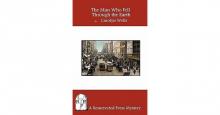 The Man Who Fell Through the Earth
The Man Who Fell Through the Earth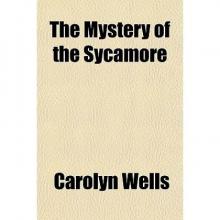 The Mystery of the Sycamore
The Mystery of the Sycamore The Mystery Girl
The Mystery Girl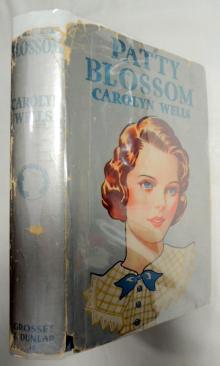 Patty Blossom
Patty Blossom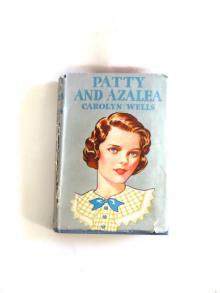 Patty and Azalea
Patty and Azalea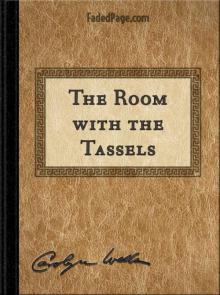 The Room with the Tassels
The Room with the Tassels The Vanishing of Betty Varian
The Vanishing of Betty Varian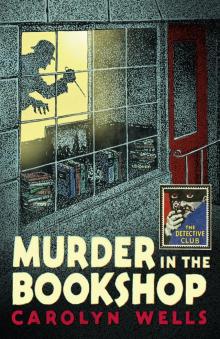 Murder in the Bookshop
Murder in the Bookshop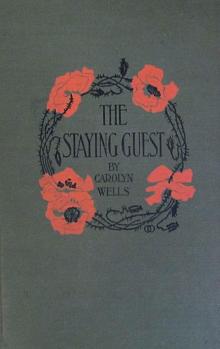 The Staying Guest
The Staying Guest The Curved Blades
The Curved Blades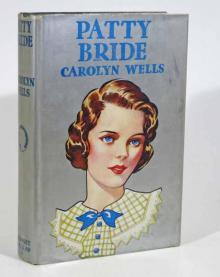 Patty—Bride
Patty—Bride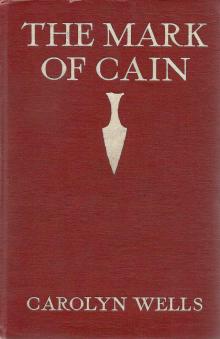 The Mark of Cain
The Mark of Cain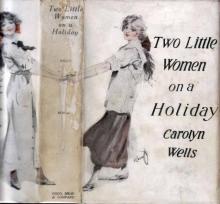 Two Little Women on a Holiday
Two Little Women on a Holiday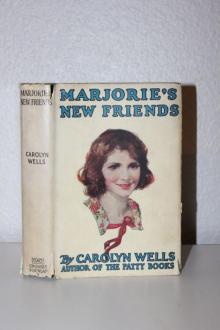 Marjorie's New Friend
Marjorie's New Friend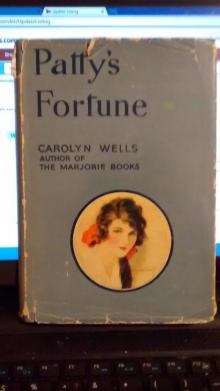 Patty's Fortune
Patty's Fortune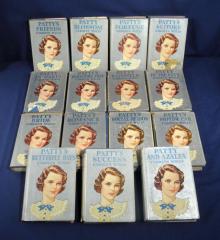 Patty's Social Season
Patty's Social Season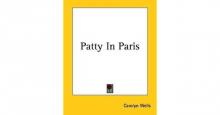 Patty in Paris
Patty in Paris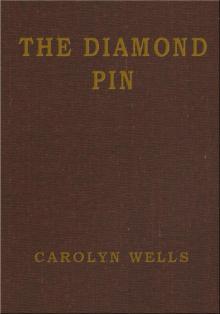 The Diamond Pin
The Diamond Pin The Come Back
The Come Back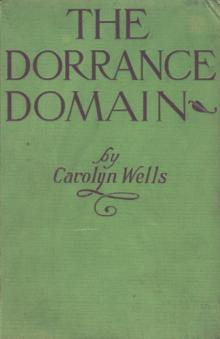 The Dorrance Domain
The Dorrance Domain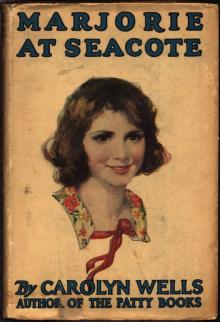 Marjorie at Seacote
Marjorie at Seacote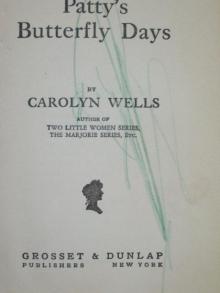 Patty's Butterfly Days
Patty's Butterfly Days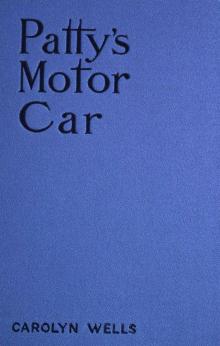 Patty's Motor Car
Patty's Motor Car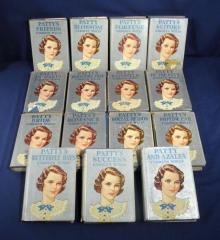 Patty's Success
Patty's Success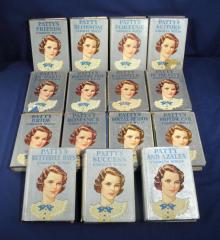 Patty's Suitors
Patty's Suitors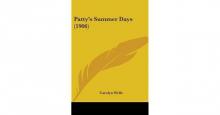 Patty's Summer Days
Patty's Summer Days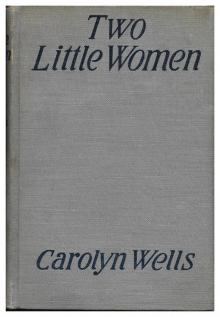 Two Little Women
Two Little Women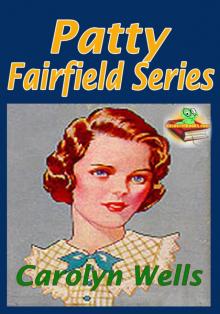 Patty Fairfield
Patty Fairfield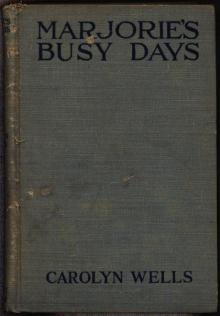 Marjorie's Busy Days
Marjorie's Busy Days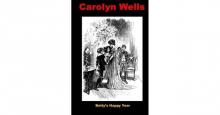 Betty's Happy Year
Betty's Happy Year In the Onyx Lobby
In the Onyx Lobby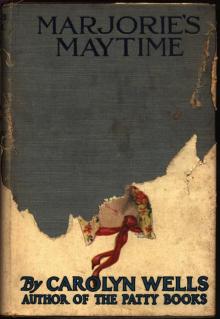 Marjorie's Maytime
Marjorie's Maytime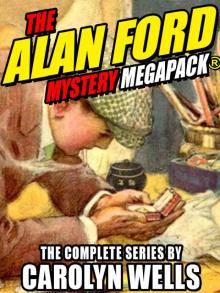 The Alan Ford Mystery MEGAPACK®
The Alan Ford Mystery MEGAPACK®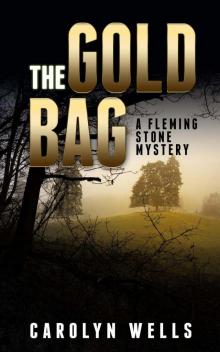 The Gold Bag
The Gold Bag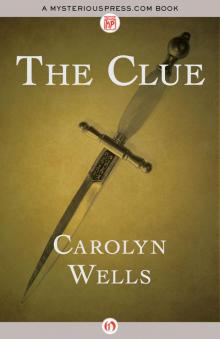 The Clue
The Clue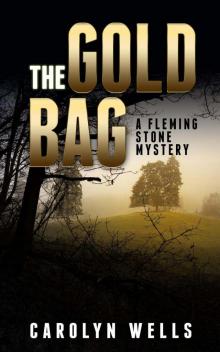 The Gold Bag : A Fleming Stone Mystery
The Gold Bag : A Fleming Stone Mystery